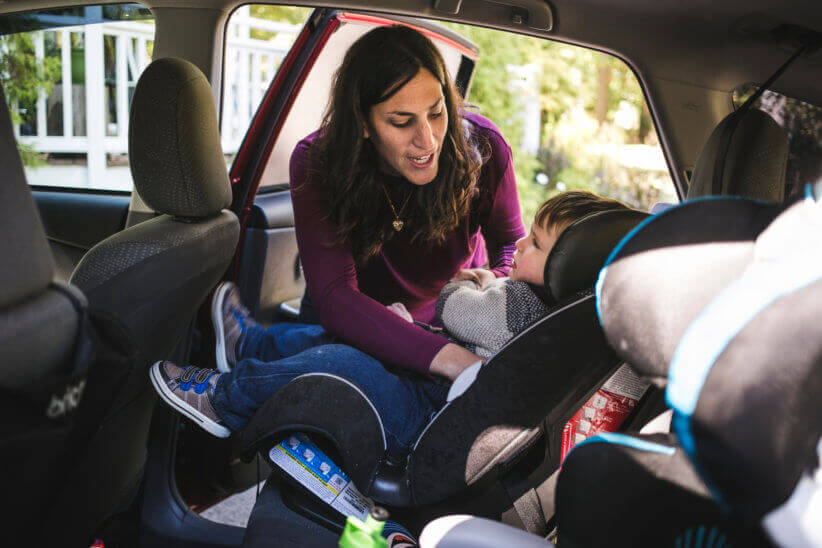In the United States, more than half a million infants are born premature each year. Many factors contribute to preterm delivery, including poor nutrition, drug and alcohol use, diabetes, hypertension, infections, heart and kidney problems, and abnormalities with the cervix or placenta.
Age is also a determinant. Women under the age of 19 or over the age of 40 have an increased risk of delivering prematurely. When carrying more than one fetus, it is common for the uterus to overstretch — leading to early labor.
Preterm delivery has risen 36 percent in the past 25 years largely due to more older mothers having babies, as well as the use of assisted reproductive technology, which increases the chance of multiple births.
Joanne Hayes conceived triplets through in vitro fertilization at 35 years old. Two years earlier, she and her husband welcomed their first child, Caitlyn, into the world. Caitlyn was born one week early at a healthy 8.5 pounds.
Hayes understood that her second pregnancy was considered high risk because she was older and carrying multiples. Common medical complications in premature babies include problems with the lungs, brain, heart, and gastrointestinal tract, as well as ineffective immune systems.
Hayes’s obstetrician started her on corticosteroids, knowing that she went into early labor at 34 weeks with Caitlyn. (Steroids help to speed up the development of the lungs and other organs, which increase the infant’s chance of survival.)
When her doctor asked if she wanted an amniocentesis (a medical procedure used to determine chromosomal abnormalities and fetal infections), Hayes refused.
“It wouldn’t have changed anything, and I wasn’t willing to risk hurting the babies.”
The first 23 weeks of Hayes’s pregnancy were uneventful. Her regular check-ups were normal and, other than tired, she felt fine. At 23 ½ weeks, Hayes experienced false labor and knew she was in trouble. Most premature babies are born “late-preterm,” between 34 and 36 weeks gestation. About 12 percent of preterm babies are born between 32 and 33 weeks, about 10 percent between 28 and 31 weeks, and about 6 percent at less than 28 weeks gestation. All premature babies are at risk for health problems, but the earlier a baby is born, the greater the risk for serious complications.
Hayes’s doctor admitted her to the hospital and put her on bed rest. She was carefully monitored and pumped with fluids to avoid dehydration. She went into true labor five weeks later. Within minutes, she had dilated from three to seven centimeters and one of her babies had already descended into the birth canal. Ryan (3.3 pounds), Christopher (2.3 pounds), and Tara (2.7 pounds) were delivered by Cesarean section in the neonatal intensive care unit at Long Island’s Stonybrook Hospital the day before Thanksgiving.
At such low birth weights, the babies lacked the fat necessary to maintain their body temperature and were immediately placed in incubators to keep them warm and protected from potential hypothermia and dehydration.
Hayes held Ryan right away, and says she remembers how tiny her largest baby felt in her arms. Christopher and Tara were immediately taken away before Hayes had a chance to see them. Ryan needed the support of continuous positive airway pressure, which delivered pressurized air to his lungs through small tubes to help him breathe. Christopher was able to breathe on his own with supplemental oxygen. Tara, the last one delivered, was immediately put on a respirator.
The lungs of preterm infants in respiratory distress are deficient in surfactant, a combination of fats and proteins that help to prevent the collapse of the air sacs in the lungs. By the second day, Tara had multiple complications. She suffered from pulmonary interstitial emphysema and was put on a jet ventilator, a loud, pounding machine, where she lay for almost a week, covered in sterile plastic resembling Saran Wrap. Finally, one of her lungs collapsed. The collapse closed up the air sacs that had been over-inflated and her condition gradually improved.
By the next week, however, Tara developed sepsis and was put on another respirator. Preemies in the neonatal intensive care unit are particularly susceptible to this serious, potentially life-threatening blood infection. The invasive procedures (intravenous lines, catheters, and tubes) used to keep them alive can provide openings for dangerous bacteria, which their underdeveloped immune systems cannot handle. If left untreated, the toxins cause the immune system to attack the body’s own organs and tissues. Tara recovered with antibiotics. Soon after she was treated for sepsis, Tara was diagnosed with a heart murmur. Fortunately, that was also corrected with medication.
The constant pressure from the jet ventilator that kept her alive is likely to have contributed to the hemorrhage the doctors spotted on an ultra sound when Tara was a month old. The bleeding caused the ventricles of her brain to rapidly expand. Some hemorrhages are mild, but severe bleeds cause pressure that can lead to brain damage, including cerebral palsy and learning and behavioral problems. Tara’s doctors continued to monitor her closely.
At 3 months old, Tara and her brothers were finally discharged from the hospital. Hayes and her husband, Michael, were relieved, but the need for medical attention was far from over. Although they were now strong enough to survive outside of a protective environment, the three siblings, who each weighed less than five pounds when they went home, required special shots on a regular basis. These synergist shots protected them from respiratory syncytial virus, a common virus that produces cold-like symptoms but can be dangerous to premature infants. The virus was such a threat to Tara, Christopher and Ryan that they could only visit the doctor after office hours, when no other children were present.
Although the Hayes triplets developed more slowly than others their age, they made slow and steady progress. Ryan came home from the hospital on an apnea monitor, but he and his brother gradually became stronger.
Tara struggled with feeding issues and continued to have medical problems. She developed aspiration pneumonia, which was treated with IV antibiotics. Her doctors attributed it to hydrocephalus. She had been vomiting from the pressure on her brain, so doctors inserted a shunt to drain the fluid and reduce the risk of brain damage.
Since then, Tara has survived three shunt replacement surgeries. Her health improved and for years she had few additional complications. Then in second grade, she began complaining of headaches. The doctors determined that her head was too small (from the constant draining of fluid) and performed an operation to enlarge her skull. The surgery was a success.
Despite the shunt that remains in her head, Tara is a happy, healthy 11 year old who loves school. She doesn’t talk much about her past trauma, but recently asked her mother about the scars that extend from ear to ear.
Both Tara and her brother Christopher were diagnosed with Attention Deficit Hyperactivity Disorder in second grade, and are doing well in school with the help of special education classes. Ryan, the first born of the triplets, is in honors classes. The boys spend their free time playing video games, building with LEGOs and firing Nerf guns. Christopher has an affinity for cooking. Like most 11-year-old girls, Tara enjoys watching TV, shopping, and texting her friends.
Hayes describes caring for her infants as “a chaotic blur.” Through it all, she clung to the positive and focused on the small changes that took place each day. She kept herself well educated so that she could be the best advocate possible for her children. The relatively recent advances in obstetrics and neonatology helped to give Ryan, Christopher and Tara life when they struggled for survival. Not so long ago, a premature baby was treated with no more than warm blankets and an oxygen mask. Today’s specialized machines, procedures, and medications provide more hope for preterm babies. Although treatment also brings risks, the technology in the neonatal intensive care unit saves many preemies whose underdeveloped bodies are vulnerable to living outside of their mother’s protective womb.
Teacher and freelance writer Laura Varoscak-DeInnocentiis is a regular contributor to New York Parenting Media. In this capacity she has won numerous editorial awards from the Parenting Media Association. She holds master’s degrees in fiction writing, education and psychology. She lives in Bay Ridge, Brooklyn, and is the proud mom of two sons, Henry and Charlie. Visit her webpage (www.examiner.com/parenting-in-new-york/laura-varoscak) for more articles on parenting.






















